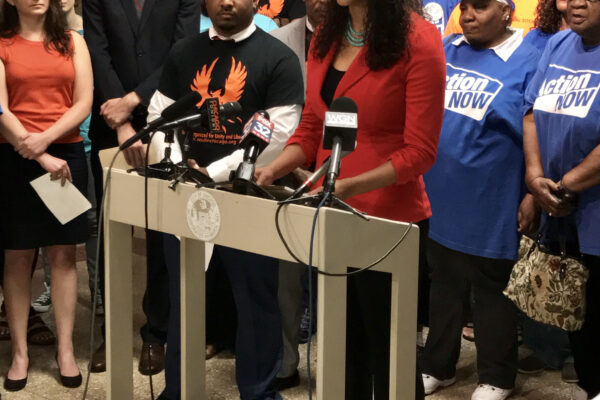CHICAGO – On the eve of the expiration of Chicago’s contract with thousands of police officers represented by the Fraternal Order of Police (FOP), community and civil rights groups from across the City appeared at City Hall today demanding changes to the police contract that will facilitate police reform. The groups, collectively known as the Coalition for Police Contracts Accountability (CPCA), urged the City to alter portions of the contract that limit transparency and accountability in the Chicago Police Department.
The City of Chicago is under close scrutiny and pressure to reform the police department after a scathing January report by the Office of Civil Rights at the US Department of Justice. The CPCA presented a list of recommended changes for the FOP contract to advance reform, focusing explicitly on provisions that encourage the “code of silence” that limits many efforts to hold police officers accountable.
“The current police contract makes it far too easy for police officers to get together and concoct a story before giving a statement in a shooting,” said Willie Preston, an organizer with Southsiders Organized for Unity and Liberation (SOUL). “The contract allows officers to change their statements about incidents without consequences, simply because they were not provided audio or video evidence before giving an initial statement.”
Pointing to another issue, Ryan Cortazar with Chicago Lawyers’ Committee for Civil Rights observed that the expiring FOP contract limits the effectiveness of investigations of police officers for abuse.
“Unlike other jurisdictions, investigators are not permitted to access past complaints against officers, except for excessive force and criminal conduct,” noted Cortazar. “These limited exceptions are not enough, ignoring important issues like patterns of false arrest, illegal searches, and racial and sexual abuse even where past complaints have been sustained.”
Another area of concern to the CPCA is contract language that requires investigators of police misconduct to provide enormous amounts of information to officers before questioning them – treatment denied civilians each day by police.
“Before ever interviewing a subject, IPRA investigators must provide a very detailed report on the facts of the case and the charges that the officer is facing,” according to Rachel Leven, Policy Manager for the Better Government Association. Once an interview begins, Leven noted that “investigators must follow uniquely technical rules during their questioning, effectively removing flexibility from the interview.”
Calling on the City Council to “get it right” on the contract, CPCA member Adeline Bracey of Action Now called on Aldermen to reject “any contract that does not include CPCA's fourteen recommendations.”
The CPCA’s recommendations have been endorsed by: ACLU of Illinois; Action Now Institute; A Just Harvest; Better Government Association; BPI; BYP100; Chicago Council of Lawyers; Chicago Lawyers Committee for Civil Rights; Chicago Urban League; Community Renewal Society; Enlace; Jewish Council on Urban Affairs; MALDEF; NAACP Chicago Westside; ONE Northside; Showing up for Racial Justice (SURJ) Chicago; Southsiders Organized for Unity and Liberation (SOUL); and Workers Center for Racial Justice.
Stay Informed
Sign up to be the first to hear about how to take action.
By completing this form, I agree to receive occasional emails per the terms of the ACLU’s privacy statement.
By completing this form, I agree to receive occasional emails per the terms of the ACLU’s privacy statement.

